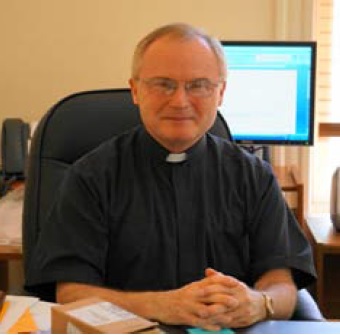 The ancients believed water to be life giving and life taking. The divers of antiquity defied the death of going into the water for something more valuable. John the Baptist gives us a preview of facing our own death to sin to be open to a new life with the one who is mightier. The discussion will ponder snorkeling in the water of Baptism, the Ten Commandments and the Book by Fr. Richard Rohr, “Breathing Under Water” to find meaning in our Lenten spiritual journey.
The ancients believed water to be life giving and life taking. The divers of antiquity defied the death of going into the water for something more valuable. John the Baptist gives us a preview of facing our own death to sin to be open to a new life with the one who is mightier. The discussion will ponder snorkeling in the water of Baptism, the Ten Commandments and the Book by Fr. Richard Rohr, “Breathing Under Water” to find meaning in our Lenten spiritual journey.
Due to technical difficulties, the first few minutes of Fr. MacKay’s lecture were not recorded. The text of the unrecorded section appears below; the audio begins after this passage. (To download a complete copy of the text, please click HERE.)
INTRODUCTION – Over 5,000 years ago, there were divers in Crete that used hollow straw reed snorkels to breathe underwater in order to look for valuable sponges. The divers would use the reeds to allow less splashing and a better view in the deep looking for something valuable. The ancients believed water to be life giving and life taking. The divers defied the death of going into the water for something more valuable.
The modern snorkel was invented in 1936 by a Dutch man for submarines. Submarines used to float at the top of the water and went under to attack valuable cargo ships bound for enemy ports. The submarine could stay under water using a snorkel for breathing and engine combustion without coming up to the surface for air. Today we have pressurized air hoses, SCUBA air tanks, and Oxygen Rebreathers, but we still rely on the snorkel to try to breathe underwater.
Fr. Richard Rohr wrote a spiritual book about Breathing Underwater as: “Only those who have tried to breathe under water know how important breathing really is, and will never take it for granted again. He was inspired by a poem by Sr. Carol Bieleck’s poem called “Breathing Underwater.” I have a handout of the poem and will read it now…
BREATHING UNDER WATER
I built my house by the sea.
Not on the sands, mind you;
not on the shifting sand.
And I built it of rock.
A strong house
by a strong sea.
And we got well acquainted, the sea and I.
Good neighbors.
Not that we spoke much.
We met in silences.
Respectful, keeping our distance,
but looking our thoughts across the fence of sand.
Always, the fence of sand our barrier,
always, the sand between.
And then one day,
-and I still don’t know how it happened –
the sea came.
Without warning.
Without welcome, even
Not sudden and swift, but a shifting across the sand like wine,
less like the flow of water than the flow of blood.
Slow, but coming.
Slow, but flowing like an open wound.
And I thought of flight and I thought of drowning and I thought of death.
And while I thought the sea crept higher, till it reached my door.
And I knew, then, there was neither flight, nor death, nor drowning.
That when the sea comes calling, you stop being neighbors,
Well acquainted, friendly-at-a-distance neighbors,
And you give your house for a coral castle,
And you learn to breathe underwater.
Sr. Carol Bieleck, RSCJ
They are the ones who do not take shipwreck or drowning lightly; they are the ones who can name ‘healing’ correctly, they are the ones who know what they have been saved from, and the only ones who develop the patience and humility to ask the right questions of God and of themselves.”
Breathing under water sounds like the opposite of what we are supposed to do in the world. But for God, the opposite is expected to transcend survival…
…to hope to ascend to what the will of God really meant for Adam and Eve, and for all of us, even if we are stuck between the waters of Heaven and Earth.
Baptism invites into a moment when God acts on us…to invite us…to save us…so we can breathe water and spirit to learn how to act…how to work with God’s grace….how to be an adopted child of God….
When we receive baptism, we commit ourselves to a way of life that begins with the Ten Commandments. When we deviate from that life, we take our spiritual breath under water and benefit by the sacraments, the grace of God and tools that are available, like the 12 Steps.
Breathing this water…this Spirit is the ground for a whole moral teaching based on the baptismal commitment and on the effects of baptism.
The letter of First Peter, understood baptism as an appeal for, or a pledge of, a clear conscience. (William A. Van Roo, SJ, The Christian Sacrament.) [“Pneuma” (??????) is an ancient Greek word for “breath”, and in a religious context for “spirit” or “soul”.] The breath of God was in existence from the beginning of time, “when His Spirit hovered over the face of the Waters.” (Tanakh JPS 1917).
Genesis begins with, “Now the earth was unformed and void, and darkness was upon the face of the deep; and the spirit of God hovered over the face of the waters…”
As we travel in this Third Week of Lent, I would like to breathe with all of you and ponder this evening the “Pneuma” the “Spirit” the Breath of God that can allow us to breathe that first spiritual breathe of our baptism. We breathed a sacrament that helped us respond to the divine offer by acting on us. A breath that is fed by the 10 Commandments, the Sacraments and paths that recognize and rely on a God to help journey from the depth of even struggling spiritual lives as in the 12 Step Program.
St. Paul sees the spiritual life as fighting against the Ten Commandments in order to lose the ‘Me” or the ego that gets in the way of our breathing underwater. In the Letter to the Romans (7:11, 13), Paul sees our sins as trying to confuse us or mislead us in fighting the commandments. It is when we die to the desire to fight the commandments we then lose the “me” and obey the commandments. We try to swim in the waters by our own rules and power so that we refuse transformation and we splash as if we are half in and half out of the water….
When we take that first real breath of the Holy Spirit by letting that me die, then we are able to breathe through a snorkel that allows us to get the glimpse of the deep. We are free to dive deeper and to return to our Holy Spirit Snorkel, or we are free to break the surface and struggle without the Holy Spirit…
Rohr quoted Einstein who said that no problem can be solved by the same consciousness that caused the problem in the first place…. The grain of wheat that must fall to the ground to die is our ego. The fruit that is waiting to grow simply waits for the person to let go and let the Spiritual Life float with God’s snorkel.
The secular world sees this in the 12 Steps and the Christian sees this in the Ten Commandments and the Sacraments.
Breathing under water doesn’t make sense. God acting on us does not make sense– in a world where we thought we succeeded, or failed on OUR OWN… It is the opposite of what we expect as Jesus tells us that:
We suffer to get well.
We surrender to win.
We die to live.
We give it away to keep it.
Every day, we can touch our baptism, every day, we touch the 10 commandments, every day, and we struggle with steps in our spiritual journey…
The Catechism of the church explains that: [2067 ] The Ten Commandments state what is required in the love of God and love of neighbor. The first three concern love of God, and the other seven love of neighbor.
Beginning with the Old Testament, the sacred books refer to the “ten words,”16 but it is in the New Covenant in Jesus Christ that their full meaning will be revealed.


